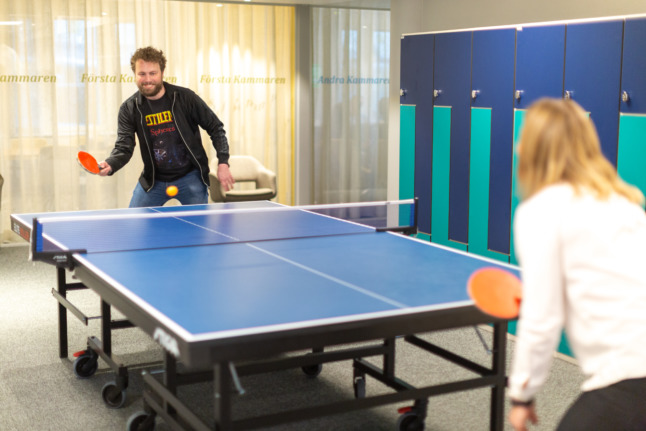Nine reasons Sweden is heaven for employees
You've heard it said - but is it true? Judge for yourself - here are nine reasons why working in Sweden rocks.

1. A whole heap of holidays
We'll start with what might be the most obvious one. With five weeks of paid vacation by law and many companies giving employees six weeks, Swedes enjoy plenty of time off work. Indeed, it's not uncommon for people in Sweden to take off an entire month or more in the summer. You won't catch them checking work email during that time, either – holidays are sacred.
2. Hej då, hierarchy!
(Hej då means bye, FYI...) Swedes love equality. From preschool to university, teachers are addressed by their first names – and a similar force is at play in the business world.
If you work at a Swedish company, chances are you know the CEO personally. You call her (or him) by her first name and nor are you afraid to share your ideas with him (or her).
Of course that applies to gender equality too. Sweden is one the most gender equal nations in the world. And while it's not perfect, you'll find the glass ceiling in Sweden is much, much higher than in most other countries.
3. The importance of parenting
Here's another one you've probably heard of: Sweden's famous parental leave system. Swedish couples receive 480 days of parental leave per child, paid at about 80 percent of their salary. And if that's not radical enough, at least 90 of those days must be used by the father - ensuring that men also get a chance to be stay-at-home dads. Parents are encouraged to split the leave as equally as possible.
We know of a few companies that even provide company hoodies for newborns before sending employees on their leave!
4. Awesome a-kassa (unemployment benefit funds, that is)
This one isn't quite as famous a parental leave and holiday – but it should be!
Sweden has a great system in place to support those who lose their jobs. Those who sign up for membership pay a monthly fee - as low as 140 kronor a month for members of Akademikernas a-kassa, a fund specifically for those with post-secondary education. And then if you should become unemployed, you can get up to 80 percent of your salary (up to a maximum of 26,400 kronor per month before tax. Now that's a safety net!
5. Strong unions
In some countries ‘union’ can be seen as a dirty word. Not so in Sweden.
Here, there are unions for essentially all branches of work, and about 70 percent of all employees in Sweden currently belong to a trade union. Unions work with employers' groups on a sector level to agree on conditions that apply across the board, and union-championed perks like a stipend for a gym membership are commonplace. And if a workplace has a “collective agreement” (kollektivavtal), agreed upon with a union, then that agreement applies to all employees – not just union members.
Members of unions frequently get perks like stipends or scholarships to help them learn new skills, too. Depending on the union, this could be anything from learning a new language to taking a class in marketing.
6. You can always learn
Speaking of learning new skills, did you know you can put your job on hold to go back to school?
In Sweden, any person who has been working at a company for at least six months has the right to take a leave of absences for studies. It's unpaid, but your job will be waiting for you when you get back. That's all thanks to the Employee’s Right to Educational Leave Act (Studieledighetslagen) of 1974. Booyah!
7. Fabulous fika (and how to do it remotely)
Fika is the Swedish social phenomenon – heavily enjoyed at work – where everyone drops what they're doing and partakes of coffee and pastries. Many companies provide regular fika for employees in ordinary times.
You don't want to miss out on some tasty office gossip and an even tastier cinnamon bun just because you've been forced to work from home, do you now? If the team fika breaks have ground to a halt during the pandemic, maybe it's time to suggest staging one via video call. In fact, in Sweden you're never required to work more than five hours without some sort of break, even if that break is just a ten-minute fika – that's the law.
 Photo: Jenny Jurnelius
Photo: Jenny JurneliusWorking in Sweden, you also get a real lunch break. Most people take a full hour off for lunch – and may even use it to enjoy some team-building fun. If you're currently feeling trapped in your apartment while working remotely, use the time to go outside for some fresh air and (hopefully!) some sun.
8. English is everywhere
Granted, there are some jobs where Swedish is a requirement. But generally in Sweden – especially in the big cities like Stockholm and Gothenburg – you can get by just fine on English.
Many Swedish companies already use English as their language of business, and even if they don't, Swedes are some of the world's very best non-native English speakers. And if you do want to learn Swedish – which you very well should – chances are you can get paid time off to go to Swedish for immigrants (SFI) classes!
9. No polyester two-pieces
Day in, day out, same old suit in the same old cubicle ... this is not a scene you would have seen in Sweden even before you started working from home.
Even in upper-crust lines of work, office attire in Sweden may be a lot more laid-back than what you're used to. Swedish style is tailored and well-fitted but also very casual: jeans and a blazer is a perfect for both men and women in professional settings.
Loose-fitted denim, oversized blouses, and messy buns are also decidedly “in”, even in many public sector jobs. So, if you return to office working later this year, put the starch away – long live modern minimalism!
This content was paid for by an advertiser and produced by The Local's Creative Studio.


Join the conversation in our comments section below. Share your own views and experience and if you have a question or suggestion for our journalists then email us at [email protected].
Please keep comments civil, constructive and on topic – and make sure to read our terms of use before getting involved.
Please log in here to leave a comment.